When can too much democracy be bad for your health?
- Published
Should health be taken out of politics?
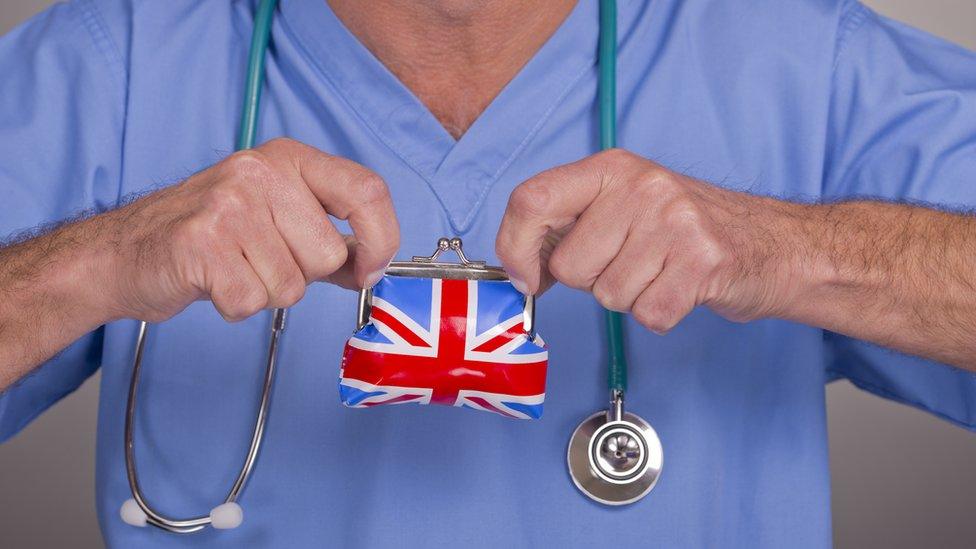
Every year the NHS accounts for nearly £120bn
It's a question I find myself asking more and more often.
Followed by a second one: As a lifelong "politics anorak", doesn't it ill behove me of all people to ask it at all?
Every year the NHS accounts for nearly £120bn. Surely there could be no more obvious example of the need for political accountability and rigorous debate among our elected representatives and decision-makers.
In every general election it is usually at, or very near, the top of most people's concerns.
And every time we hear the rival parties trading blows over whether or not the health service is safe in their, or their opponents', hands.
Last year it became more like a bidding war, as the Conservatives and Labour did their best to trump each other's spending commitments.
Labour accused the Conservatives of having secret plans to privatise the NHS. The Conservatives countered that Labour had been found out trying to "weaponise the health service" during the campaign.
And so it goes on and on. And what has been the net effect of all this politics in health?
People power?
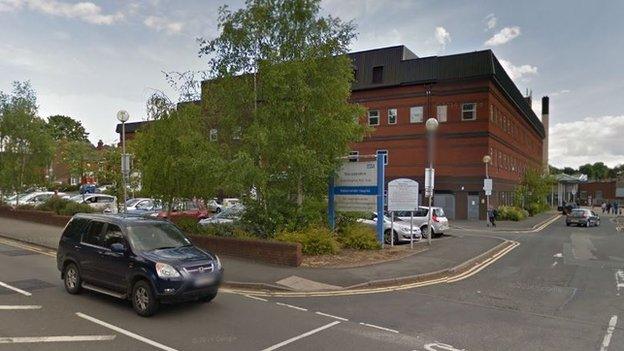
Plans to close Kidderminster's district general hospital (pictured) in the early days of the Blair government led to the defeat of one of his ministers in the Wyre Forest constituency
Too often the result looks like a series of turf wars between rival MPs, especially those with major hospital issues in marginal seats.
Plans to close Kidderminster's district general hospital in the early days of the Blair government led to the defeat of one of his ministers in the Wyre Forest constituency, which was sensationally captured by the independent health campaigners.
Their successful campaign to reassert democracy in hospital decision-making was hailed at the time as people power.
Their achievement in having the hospital merely downgraded rather than closed altogether has often been blamed since then by their critics for a skewing of the health market in Worcestershire in ways which make it difficult to find a county-wide solution to this day.
The Worcestershire Royal Hospital in Worcester, the Alexandra in Redditch and even Birmingham's Queen Elizabeth Hospital have all become embroiled in it to a greater or lesser extent, with MPs for each of those places well to the fore.
Stafford
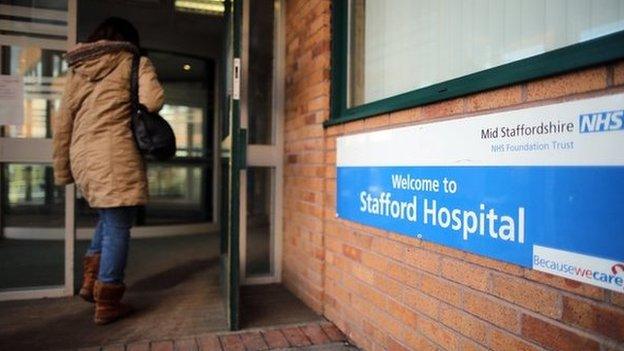
The dash for NHS foundation trust status at the urging of the then government certainly did not encourage Stafford Hospital managers to maintain their focus on the standard of care delivered to vulnerable patients
It would of course be grossly unfair to hold our political leaders totally responsible for the most notorious and distressing scandal in the generally distinguished history of the NHS.
But the dash for NHS foundation trust status at the urging of the then government certainly did not encourage Stafford Hospital managers to maintain their focus on the standard of care delivered to vulnerable patients.
In the resultant shake-up we were treated, inevitably, to yet another round of political turf wars.
As the University Hospitals of North Staffordshire in Stoke became the county's main centre of gravity, MPs defending what remained in Stafford and Cannock were joined by others with collateral interests in Wolverhampton and Walsall, all battling to press their sometimes rival or even conflicting claims.
And so to Shropshire.....
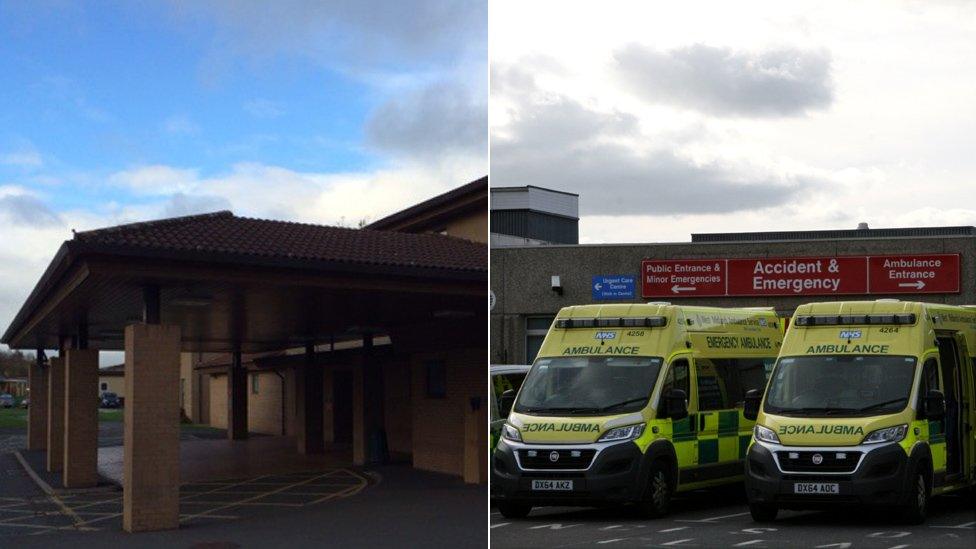
Shropshire is at loggerheads over whether major hospital services should be concentrated at the Royal Shrewsbury Hospital or the Princess Royal Hospital in Telford
For over two years the county has been at loggerheads over whether major hospital services including accident and emergency should be concentrated at the Royal Shrewsbury Hospital or the Princess Royal Hospital in Telford.
Or could they remain at both?
After last week's angry and ultimately inconclusive meeting of the Shropshire and Telford and Wrekin clinical commissioning groups, any decision seems to be as far away as ever.
And, surprise surprise, yet more turf warfare ensues: The MPs past and present for Telford along with the Wrekin are on one side while the Right Honourable Member for North Shropshire is on the other.
Meantime, their colleagues for Shrewsbury and Ludlow are still hoping to keep both options open.
Health warning
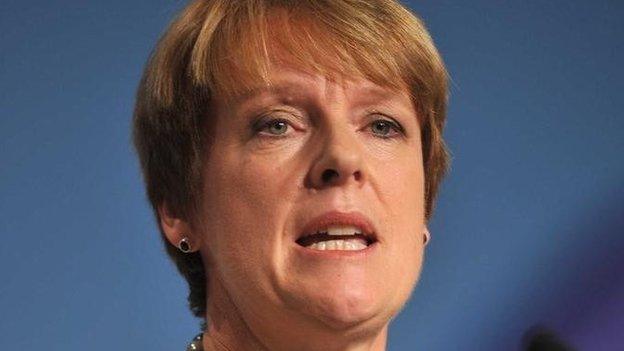
Meriden MP Caroline Spelman says some of the West Midlands' biggest hospitals, including Heartlands in her area, face serious challenges
How can our MPs be expected to do anything other than emphasise the interests of their constituencies?
And why shouldn't the rival parties give each other a hard time about their health credentials and spending plans?
Isn't this all part of our robust democracy? It's what politicians are for.
Given the pressures of our aging population, decisions about complex hospital services increasingly cuts across and between conventional political boundaries.
And as more and more high-tech, high cost treatments become available, the tension between our expectations of the health service and what (or how) we are prepared to pay for it can only intensify.
Never featured
Could devolution deliver joined-up pan-regional solutions?
That's certainly what they hope in north-west England, where the NHS is a principal element of an unprecedented package of political and spending powers devolved from Whitehall.
But in the Midlands, health (apart from mental health) has never featured in the conversation.
When I pointed this out to Meriden's Conservative MP, the former cabinet minister Caroline Spelman, she reminded me that some of our biggest hospitals, including Heartlands in her area, face very serious challenges.
She said she believes the new combined authority and its metro mayor must not be burdened with complex liabilities before they have even started work.
Immigration debate
So what can be done?
Would a greater degree of inter-party co-operation help? After all, the sins of one government often have a habit of being visited on another. A cross-party commission is suggested by some health commentators.
I wonder if we can draw some comfort from the way the immigration debate has evolved since the days when no-one could air concerns about it without being accused of "playing the race card" or "dog whistle politics". Now all the parties are agreed that there are important issues here which need to be discussed thoroughly and openly. The basic tenor of debate has generally become better-informed and clearer as a result.
Old-fashioned knockabout
So, finally, an answer to the question I asked myself at the start.
Health may be far too important to be taken out of politics. But perhaps we should all resist the sterile, old-fashioned knockabout.
I'll be doing my best to help raise our game in this weekend's Sunday Politics, where we'll try to shed light on Shropshire's intractable health dilemma. Or since there are three possible options, does that make it a trilemma?
Joining me in the studio will be the defence minister and Conservative MP for Ludlow Philip Dunne; the Labour MP for Birmingham Edgbaston and former health minister Gisela Stuart; and Gill George, who campaigns for "Defend our NHS" in Shropshire.
And I hope you will join us too, in our usual 11.00 slot on BBC One Midlands this Sunday, 22 May 2016.